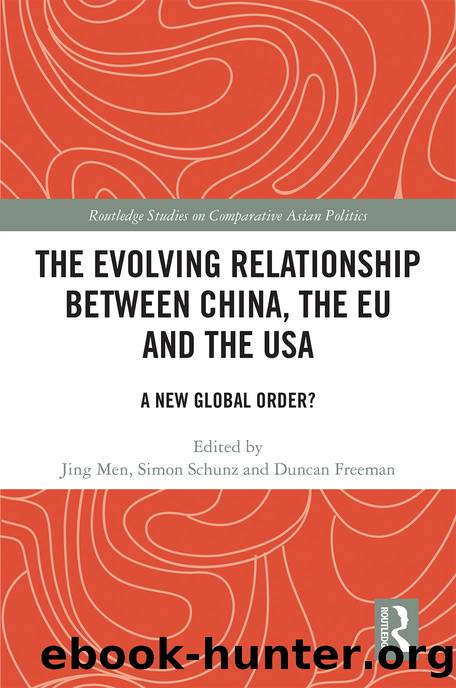The Evolving Relationship Between China, the Eu and the USA: A New Global Order? by Jing Men & Simon Schunz & Duncan Freeman

Author:Jing Men & Simon Schunz & Duncan Freeman [Men, Jing & Schunz, Simon & Freeman, Duncan]
Language: eng
Format: epub
ISBN: 9780429646652
Goodreads: 52427206
Publisher: Routledge
Published: 2019-11-27T00:00:00+00:00
Conceptual framework
International order does not change easily since the organizing rules and institutions of world politics are embedded in wider structures, and opportunities for change arise mainly out of critical junctures such as wars and crises. Given this path dependence, rising states have to deal with legacies of deeply entrenched interests, ideas and institutional arrangements. Trade policy can be seen as a reaction to the constraints and opportunities flowing from the international political economy structures, which are likely to affect the preferences of societal actors, governments and EU institutions. These actors make their decisions based on the interests they have or ideas they hold.
Power, institutions and ideas roughly reflect the central tenets of mainstream IR theories. For neorealism, anarchy is the ordering principle of the international system; it constrains the behaviour of states and renders the relative distribution of power across states important. Neoliberal institutionalism attributes an important role to international institutions in shaping the international structure and mitigating the effects of anarchy. And constructivist IR theory is concerned with how ideas define international structure. As argued by Oriol et al. (2016: 16), âany structure can be transformed into another one through normative, institutional and power-related changesâ.
Drawing on a neorealist perspective, power is best captured by material resources (Waltz 1979: 192), and â[t]he structure of a system changes with changes in the distribution of capabilities across the systemâs unitsâ (ibid.: 97). International power configurations may differ considerably between distinct policy domains. At the systemic level, economic power resources typically rely on relative shares of gross domestic product (GDP), trade or FDI.
Neoliberal institutionalism defines institutions as âpersistent and connected sets of rules (formal and informal) that prescribe behavioural roles, constrain activity, and shape expectationsâ (Keohane 1988: 383). International institutions âcan reflect, stabilise and perpetuate a given distribution of power and/or a given perception of legitimacy for actors and ideasâ (Oriol et al. 2016: 6). They can thus also become a battlefield of shifts in power and ideas.
Ideas are beliefs held by individuals, describing intersubjective meanings which are to varying degrees shared by different actors, including about the legitimacy of the prevailing international order. Wendt (1999: 309) argues that âthe most important structures in which states are embedded are made of ideasâ. According to Woods (1995: 161), âa state perceives its international economic interests on the basis of a set of ideas or beliefs about how the world economy works and what opportunities exist within itâ. Economic ideas such as neoliberalism, (neo)mercantilism or dependencia can influence trade policy, as can other, not necessarily commercial ideas, for instance about sustainable development or human rights.
Download
This site does not store any files on its server. We only index and link to content provided by other sites. Please contact the content providers to delete copyright contents if any and email us, we'll remove relevant links or contents immediately.
| Anthropology | Archaeology |
| Philosophy | Politics & Government |
| Social Sciences | Sociology |
| Women's Studies |
Born to Run: by Christopher McDougall(7120)
The Leavers by Lisa Ko(6945)
iGen by Jean M. Twenge(5408)
Sapiens by Yuval Noah Harari(5365)
Spare by Prince Harry The Duke of Sussex(5176)
The Kite Runner by Khaled Hosseini(5168)
Machine Learning at Scale with H2O by Gregory Keys | David Whiting(4292)
Bullshit Jobs by David Graeber(4179)
Never by Ken Follett(3937)
Goodbye Paradise(3798)
Livewired by David Eagleman(3764)
Fairy Tale by Stephen King(3370)
A Dictionary of Sociology by Unknown(3073)
Harry Potter 4 - Harry Potter and The Goblet of Fire by J.K.Rowling(3060)
The Social Psychology of Inequality by Unknown(3018)
The Club by A.L. Brooks(2919)
Will by Will Smith(2908)
0041152001443424520 .pdf by Unknown(2843)
People of the Earth: An Introduction to World Prehistory by Dr. Brian Fagan & Nadia Durrani(2727)
